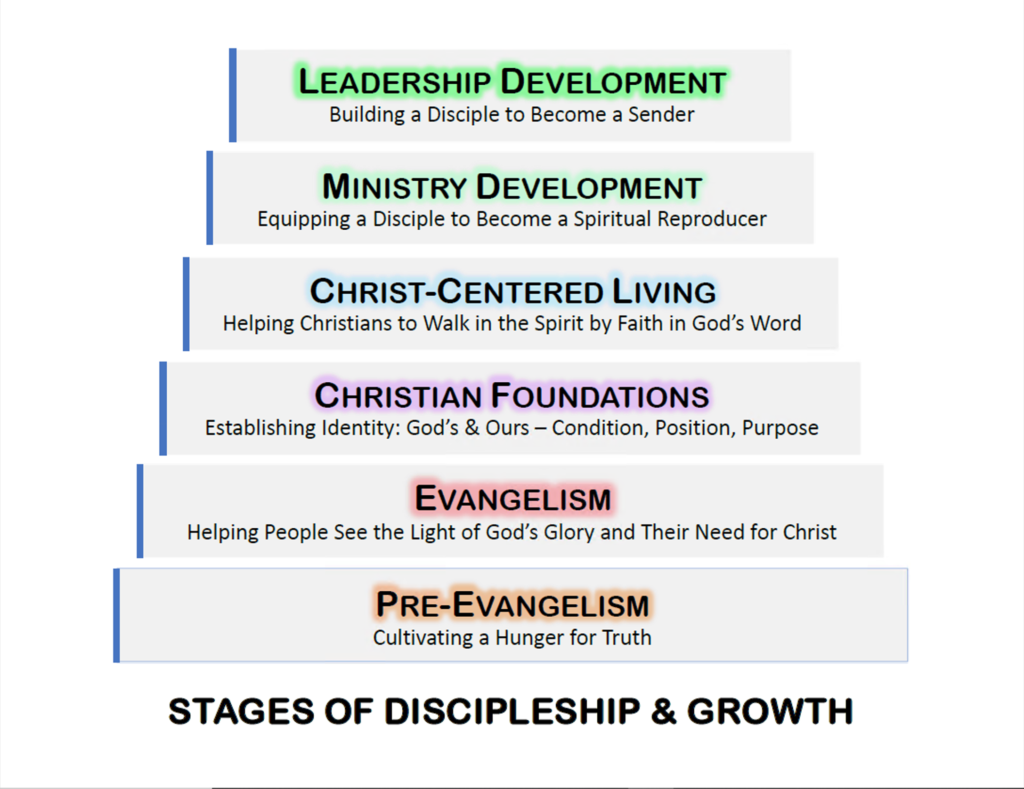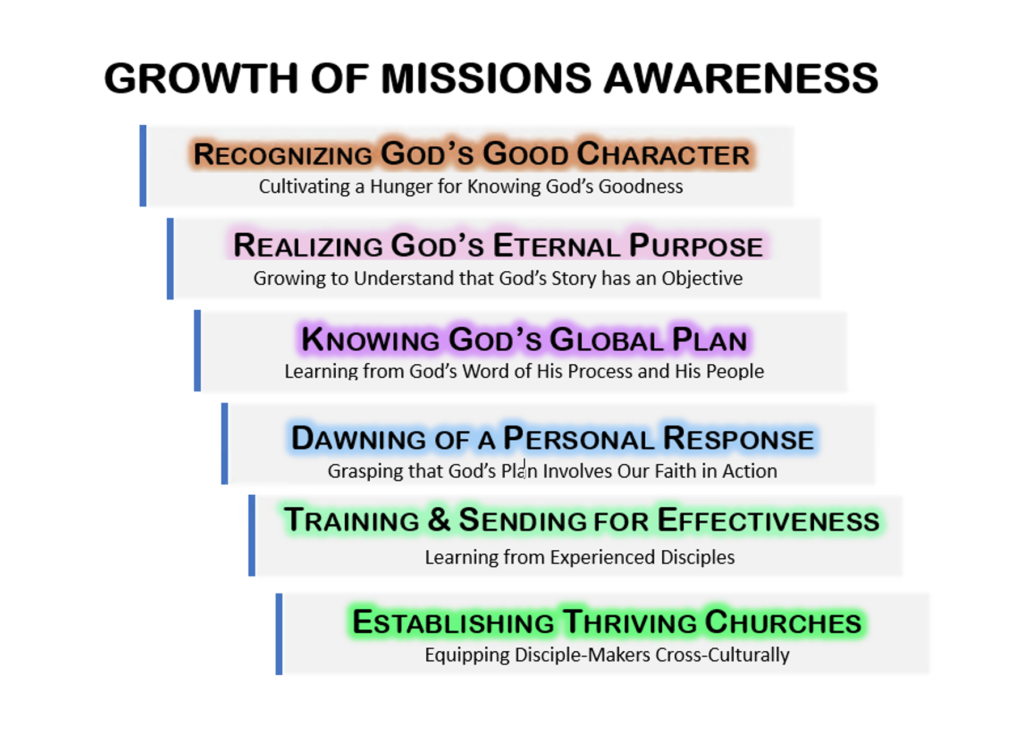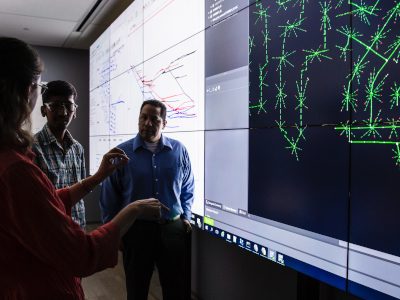
Equip
Helping Each Other Complete the Master’s Commission
Some of the greatest needs in missions are:
— People who are ready to be sent to minister.
— People who will prepare them to be sent and then send them.
People in thousands of languages still have no access to the Gospel, a Christian or a Bible in a language they understand.
Who will go tell them?
Who will send those who go?
That The World May Know
“I in them, and thou in me, that they may be made perfect in one; and that the world may know that thou hast sent me, and hast loved them, as thou hast loved me.” – John 17:23
“Who gave himself for us, that he might redeem us from all iniquity,
and purify unto himself a peculiar people, zealous of good works.” – Titus 2:14
Would any of us have faith in the Lord Jesus Christ if throughout history Christians had not obeyed God and empowered succeeding generations to communicate the Good News?
If mission is God’s idea, and each of us is indwelt by the Holy Spirit, and we each have a role to play in His plan according to His purpose, then how can we help each other to practically engage, by faith, in meaningful ways?
God has given to each of us practical spiritual gifts to do the good works he has prepared for us to do. (See Ephesians 2:10)
Missions begins in the local church.
The local church is the objective of missions.
Until Christ comes for His bride,
our role is to lead people to believe Him
and equip them to glorify Him
in the way that they live, think, and act
as they engage is His mission.
Missions focuses on two dimensions of reaching the unreached:
- The first and primary is the establishing of a gospel witness among them.
- The second is to mobilize, train and support those who have the best chance of being physically present [to do that]. – Doug B.
“For the body is not one member, but many.” – 1 Corinthians 12:14
Missions is sometimes conducted as if a cowboy were performing a show and the role of the rest of the participants is to throw money into his hat so that the show can continue.
In his letter to the Ephesian church, the Apostle Paul shows us that ministry is a function of the Body of Christ. A team. A single body moving together with different functions toward common purposes under the direction of the Head.
Communication and cooperation are a big part of any body function.
If there are Christians who do not know that 2 billion people have not yet heard of Jesus and have no way to learn about what He did for them, then we need to tell them. We need to help each other learn what we can do to change that.
Hearing is a good start. Telling others is better. Doing something together to empower others is better yet.
The most effective communications are friends telling friends because it is what is on their hearts.
If Christ is the Head, are local church leaders the nerves?
How can we put practical tools in the hands of everyone who is willing to engage to promote mission success?
What can we do together to move the needle toward completion of the Great Commission, especially among the language groups of people who have never heard the Gospel? What works can we add to our faith that will move us toward reaching that last language group with the Good News?
The Body of Christ will be much more effective at mobilizing the Church toward completing the Great Commission if we empower the whole Body rather than just a small contingent of mobilizers criss-crossing the country to speak in schools, churches, and universities.
How do we empower believers of every age to grow in their understanding of God’s eternal purpose for their earthly lives in regard to the language groups of people yet unreached with the Gospel? What can we do to help each other carry that vision to our peers? What tools, resources, videos, and web pages could be useful to the team?
This page is about equipping people with information, tools, and resources to engage in the Great Commission.
For the perfecting of the saints, for the work of the ministry, for the edifying of the body of Christ: – Ephesians:4:12
We are all about relationships.
God designed us as relational creatures.
How can we all have a part
in developing those relationships
which encourage meaningful action
toward reaching people
who are the least reached with the Gospel?
Teamwork of the Body
“If the foot shall say, Because I am not the hand, I am not of the body; is it therefore not of the body?” – 1 Corinthians 12:15
Initially, the purpose of this page was to put practical ideas, tools, web sites, videos and resources on this page to enable people to work with us in casting the vision of reaching every unreached ethnolinguistic people group with the Gospel. I want to cast the vision that all of the body, each member, under the leadership of the local church, under the direction of Christ as the Head, has a role and a responsibility in God’s mission to proclaim His glory to the world and draw people to Himself. Let’s inform, equip, and empower people to use those gifts.
Many people in the churches simply do not know…
Some don’t know who God is at all, so His person, purpose, plan, people, and process are not in their thoughts. Together, we can help them to learn of God’s amazing character and purpose.
Other people may not realize how big of a role, position, and plan God has laid out for them as individuals. Together, we can help them to see what they might do to glorify God and encourage them to take action based on God’s written word.
Many people do not know that one-third of the people in the world have never heard of Jesus. They do not know that people in one-third of the world’s seven thousand languages have no access to a Bible* or a messenger* who could tell them of Jesus as our Savior in a language they understand. We could let them know about the great need for messengers, the Bible basis for faith toward action, and ways they can help
There are people who are busy in missions, or want to be, but they are not sure of the objective, what needs to be done, or how to assist the team. Together, we can give them the information they need to engage their willing hearts in the role for which God has prepared them.
Much of missions effort is focused on delivering the Gospel to people who have already heard the message repeatedly. That is good, but not to the exclusion of people who have never had the opportunity to hear.
There was a time when our people did not have access to the Gospel. Someone brought the Good News to us. We should also put the spotlight on the language groups of people who have not once had any opportunity at all to hear the Good News about Jesus.
Look What Could Be
Thus saith the LORD, Stand ye in the ways, and see, and ask for the old paths, where is the good way, and walk therein, and ye shall find rest for your souls… – Isaiah 30:21
“Say not ye, There are yet four months, and then cometh harvest? behold, I say unto you, Lift up your eyes, and look on the fields; for they are white already to harvest.” – John 4:35
“Then saith he unto his disciples, The harvest truly is plenteous, but the labourers are few; Pray ye therefore the Lord of the harvest, that he will send forth labourers into his harvest.” – Matthew 9:37-38


Empowering all for Mission
If the Holy Spirit empowers each believer with individual gifts, talents, and experience, then it is in the best interest of the Body to seek and to provide the opportunity for those individual parts of any age to function in unity to benefit the whole.
Missions exists because God’s worth has not been recognized and shipped.
Leaders
“Take heed therefore unto yourselves, and to all the flock, over the which the Holy Ghost hath made you overseers, to feed the church of God, which he hath purchased with his own blood.” – Acts 20:28
Did you realize that Paul was not the only missionary among the Apostles? All but one (?) died ministering outside of their home country in cross-cultural ministry. It looks like they didn’t just delegate “missions” to a committee in the church, but were personally fully engaged in fulfilling the Great Commission in their generation. While their transformation was dramatic, they didn’t come by their ministry tools suddenly. They spent three years with their Master studying His written word and learning practical application.
It seems that the greatest need in missions is people who have been prepared in their local churches to engage in the work of the ministry. People are needed who have realized the holiness and goodness of God, have seen themselves as helplessly short of His glory and desperately in need of the righteousness of Jesus Christ as their sufficient Savior, and have placed their faith in His word and work. To be sent as career missionaries people need to be sure of their salvation in Christ, secure in their identity in Christ, maturing in their faith as demonstrated by what they do, and willing-hearted to engage in the good works which God prepared for us to do. If their ministry is church planting then they need to be at least on a trajectory to be qualified to ordain church leaders in the churches they plant.
From before the foundations of the world, God knew each one of us by name. (Eph. 1:20) He has an eternal purpose for each of us. He has prepared good works which He has before ordained for us. (Eph. 2:10)
Do people know this before someone tells them? It is our privilege to show them God’s person, purpose, plan, people, and process. Rooted in His identity, established in their own identity in Christ, aware of His purpose for them on earth, and engaged in ministering to others, some might be set apart to extend the ministry to places where is still unknown.
The mission of the Church is being accomplished through the efforts of the local church.
The ministry of the word and prayer, under the power of the Holy Spirit, and the guidance of church leaders is where Body efforts start toward sending people “on mission”.
Leaders have the unique opportunity to establish a culture of studying God’s written word for wisdom, praying in expectation that the Holy Spirit will give direction, and acting to guide the local Body, by faith, to accomplish things that may seem difficult, or at least unfamiliar, in other places.
Unless there are people who are rooted in Christ and equipped for ministry the outreach ministry cannot be accomplished.
Teaching obedience (Matthew 28:20) precedes having people ready to obey and to be sent.
There are some tools which have been used very effectively by other believers in laying Biblical foundations, equipping people for ministry, casting vision for the least reached peoples, and sending representatives from local churches to work with teams who are actively working to establish thriving churches.
Key Components May Include:
- Cleary and consistently casting ministry vision as a Body
- Providing clear paths for discipleship toward maturity & ministry
- Keeping the progress of the completing the Great Commission in front of the church
- Preparing the congregation to serve as senders
- Seeking the Lord about whom to send from the congregation
AccessTruth (Australia) has produced a lot of online resources to assist local churches with equipping members for service overseas.
Candidates who are qualified by their local church can be sent for further equipping specific for their mission.
Ethnos360 Bible Institute is great resource to gain Bible knowledge from experienced missionaries either in person or online.
See Stages of Equipping
See What Others Have Done –> Randy’s Web Links
These are outstanding resources based on the guidelines Ethnos360 uses to establish thriving churches among the people groups least reached with the Gospel…
Resources for Leaders
Rooted in Christ?
- By far, the most effective resource I have seen is establishseries.com
- Establish Discipler series — Sample.
- Establish Series
- This is based on the Building Firm Foundations resources which has been used effectively around the world for many years.
- Firm Foundations (Part 1)
- Building on Firm Foundations (Volumes 1-9)
- Download Volume 1 for Bible basis.
- Secure in Christ
- Equipped to Serve
- Rock Solid Kids – rocksolidkids.org
- Interlocked (youth/adult) – interlocked.online
- God’s Narrative: Genesis to Christ
- Access Truth: Cross-cultural Essentials
Equipped for Ministry?
- The Historical Identity of Jesus
- Secure in Christ
- Individual’s identity in Christ
- God’s purpose in the world
- God’s Plan to reach the world
- Engaging our community
- Acknowledged and sent by the Body
- Serving As Senders by Neal Pirolo
- Ministry Belongs to the Members
- When Everything Is Missions (PDF)
- We must be awakened to the great disparity… fb.watch/3U0ZMOdxbC/
Opportunities to engage?
Culture of purpose?
We all set cultures in the communities we lead by the things we talk about, what we value, and where we invite people to engage. Are we setting a culture of an expectation to grow to spiritual maturity? Is there a culture where everyone knows a path to growth? Do people know the end goal? Is there a culture where every gift is appreciated, where grace is extended, where people are loved, yet sin is not harbored? Are we establishing a culture of teamwork to provoke one another to love and good works that extends to the ends of the earth? Are we setting a culture of purpose that includes unreached language groups?
Empowering the team?
Leaders have the privilege of helping people to discover their gifts, guiding people to use their gifts with wisdom, and providing opportunities or vision to use what has been given for the good works that God has prepared in advance for us to do.
Moreover, leaders have the opportunity to set the example what this means, “Be ye followers of me, even as I also am of Christ.” (1 Corinthians 11:1)
teamwork videos
more teamwork
Teams – working together at home and abroad to see A Thriving Church for Every People
Join church planting teams
Ethnos360 is made up of thousands of missionaries from around the world who have been sent by their own local churches to work as a team toward establishing thriving churches among unreached language groups of people. You can learn more about how your church can engage through the booklet, “Your Church and Ethnos360” at the link below.
Missions Committees
“Then pleased it the apostles and elders, with the whole church, to send chosen men of their own company to Antioch with Paul and Barnabas; namely, Judas surnamed Barsabas, and Silas, chief men among the brethren:” – Acts 15:22
The context of Acts 15:22 is a delegation from the church in Jerusalem going to Antioch to deliver a letter to the Gentile churches about freedom from Jewish customs.
The pattern of behavior is very similar to the commissioning of Saul and Barnabas, who were already active in ministry.
“As they ministered to the Lord, and fasted, the Holy Ghost said, Separate me Barnabas and Saul for the work whereunto I have called them. And when they had fasted and prayed, and laid their hands on them, they sent them away.” – Acts 13:2-3
The pattern established was that of marking Biblically qualified leaders who had been trained within the local church, were already actively engaging in ministry, recognized by the congregation, and set apart by the power of the Holy Spirit as the leadership of that church devoted themselves to the Word and prayer.
What would happen if western churches intentionally prepared people to be sent from the local church as ambassadors of Christ to the unreached languages?
What would it take to have people in the church who are ready to be sent as teachers or ambassadors on short notice? Who would your church send to teach all that Christ commanded, equip the saints for ministry, and ordain Biblically qualified church leaders?
What would it take to develop a culture among the Body such that the whole church is ready to send some key teachers to some other place to minister?
Knowledge of the message
Secure in Christ
Equipped for Ministry
A Sending Culture
Faith in God’s Provision
Awareness of the Needs
Dependence upon the Holy Spirit
Unity in the Body
What is the culture of your church in regard to the Great Commission?
- Are people aware of God’s identity, person, purpose, and plan?
- Are people aware that so many language groups of people have not been told the Good News about Jesus and no messengers at are on the way to tell them?*
- What level of urgency is common in the church in regard to sharing the Gospel with people who have never heard?
- Is your congregation actively evangelistic in your community?
- When the word “missions” is spoken, what is the first thing that comes to mind to church members?
- In your congregation’s general use of the word “missions” are they talking about the activities modeled by the apostles of Jesus or something else? (All but James died in foreign countries.)
- What ministries supported by the church as “missions” are focused on teaching everything that Christ commanded? (Matthew 28:20)
- To what degree is your congregation focused on going “into all the world” to preach the Gospel?
- How much of your missions effort is directed toward people who have never had another opportunity to hear about Jesus?
- Does your congregation devote more resources to people who have already heard the Gospel or to telling people who have no opportunity to hear about Jesus?
- Does the word “missionary” bring to mind people like the Apostle Paul, Adoniram Judson, Hudson Taylor, David Livingstone, Amy Carmichal, Jim Elliot, Nate Saint, and the like?
- Does the word “missionary” have with it the concept of a mission of dying to self, laying down one’s life, or living sacrificially so that other may live eternally?
- What is the level of missionary biography literacy* in your congregation?
- What is the plan to teach unreached people to love God with all of their heart, soul, mind, and strength? In both home evangelism and foreign missions?
- How do you know when the mission has been accomplished in a particular location?


How can you promote missions in your church?
And let us consider one another to provoke unto love and to good works: Hebrews 10:24
Missions Music – ntmbooks.com – Songs of Challenge
Evangelize. Effective evangelism is a great way to expand and strengthen team of people who rejoice at the greatness of God’s goodness. New believers cause other believers to grow as they ask questions. Believers who engage in evangelism grow in understanding God’s power and purpose for them in the world as they observe Him transform lives.
Establish. Knowing God’s person, purpose, plan, people, and process is key to a body of people pulling together in the same direction. We cannot teach what we do not know. It is important that all believers be established in the identity of Christ, in their own identity in Christ, and in God purpose for the church on earth and revealed in His written Word. (goodseed, LW, Tactics, BFF, FF, AII, RSK)
Equip. Equipping people for ministry involves living life with them in discipleship. Equipping involves teaching but also working together in ministry to other people. How do you help people to apply God’s word to their own lives, to see the needs of people around them, and to actively engage at personal expense to meet them? (AT, EBI)
Educate. Has the Great Commission been completed? Where are people who have no access to the Gospel? What are the barriers to completing the work? What are the logistics of teaching everything to ethnolinguistic people groups who are still untold? How do you learn an unwritten language? What does culture have to do with it? How do you establish literacy and why? What is the goal of missions? Who is working to reach the people who have no access to the Gospel? What is a thriving church? What happened to the resources? Where are the people who could complete the Great Commission?
Engage. Prepare people to be sent as career missionaries. Prepare to send your people as career missions. Show what it takes to reach the least reached language groups. Show videos. Stories. Engage with people who have been sent by other churches. Missionaries. Representatives. Be an advocate. Educate. Equip. Establish. Evangelize. Send.
Encourage. God’s worldwide work is a Body effort. (Ephesians – all of if.) As the apostle Paul reached out to the Gentiles, did you notice all of the other people involved in his ministry as companions, hosts, senders, messengers, couriers, and followup? There are roles all of us can engage in during the stages of our lives. Prayer being the easiest, followed closely by communication.
Resources
Missions Magazines –
- Portrait of a Missions-Minded Church (Shadow Mountain Community Church)
- Sent by the Church (First Baptist Church of Magnolia)
- YOU Can Make a Difference (Businesses supporting missions)
- The Benefit of Missions (Community Baptist Church of Mountoursville)
These are to show missions committees some resources, ideas, training, vision-casting, activities, and worldview changing tools and programs.
——————————
(Such as Wayumi, Perspectives, Joshua Project Resources, bulletin inserts, The Traveling Team, biographies, inspiring videos with brief descriptions, ethnos360 videos, etc. This page needs work.)
- A Third of Us – athirdofus.com – The Alliance for the Unreached
- Catalyst Services – catalystservices.org – Catalyzing missions resources, committees, & assistance.
- IAMA – International Association of Missionary Aviation
- Missio Nexus – missionexus.org – Catalyzing relationships, ideas, and collaboration within the Great Commission Community.
- Sixteen:Fifteen – 1615.org – Keys to Unlock Missions Potential
- Radical – radical.net – Radical trains and equips churches and followers of Christ to spread gospel hope on the front lines of urgent need among the nations.
- People Groups – peoplegroups.org – IMB research
- Wycliffe Scripture Access Statistics – wycliffe.net/resources/statistics/ – Status of Bible Translation & World languages
- When Everything is Missions – wheneverythingismissions.com
- TEAM – 3 Reasons Why Your Church Needs a Missions Committee
- ABWE – How to Build a Unstoppable Missions Committee in Your Church: 10 Time-Tested Fundamentals
Families
Train up a child in the way he should go: and when he is old, he will not depart from it. – Proverbs 22:6
I was six years old when I understood that I needed a perfect Savior because of my sinful unrighteousness that disqualified me to stand without condemnation in the perfect presence of the Holy God, our Creator.
At age eight I began to realize the importance of going to people who have no access to the Gospel to share with them what Jesus has accomplished for them.
At fifteen years old I had set my path toward missionary aviation.
My parents were primarily responsible for giving me the information I needed. They were intentional but not coercive. The choices were mine but they provided the opportunities for me to learn more.
4Hear, O Israel: The LORD our God is one LORD: 5And thou shalt love the LORD thy God with all thine heart, and with all thy soul, and with all thy might. 6And these words, which I command thee this day, shall be in thine heart: 7And thou shalt teach them diligently unto thy children, and shalt talk of them when thou sittest in thine house, and when thou walkest by the way, and when thou liest down, and when thou risest up. 8And thou shalt bind them for a sign upon thine hand, and they shall be as frontlets between thine eyes. 9And thou shalt write them upon the posts of thy house, and on thy gates. – Deuteronomy 6:4-9
36Master, which is the great commandment in the law? 37Jesus said unto him, Thou shalt love the Lord thy God with all thy heart, and with all thy soul, and with all thy mind. 38This is the first and great commandment. 39And the second is like unto it, Thou shalt love thy neighbour as thyself. 40On these two commandments hang all the law and the prophets. – Matthew 22:36-40
“We will not hide them from their children, shewing to the generation to come the praises of the LORD, and his strength, and his wonderful works that he hath done.” – Psalms 78:4
under construction! – don’t forget to clean this up…
[under construction] [This is still in the idea stage. Intended as a supplement to encourage parents and reference resources. Meanwhile, check our leaders section, missions section. Eventually I would like to feature tools for parents such as “The Lamb“, “Firm Foundations Children’s Edition, “Rock Solid Kids” by Jill Goring (See the Teacher’s Guide!), “King of Glory” videos, possibly direction to specific “Foundation Matters” materials (such as reachtheisles.com/video for students) after further review and introduction, missionary biographies (stilluntold.org/books – but for children), the missionary video series by Torchlighters (Adoniram and Ann Judson) and various resources that can assist parents with cultivating a heart for God, for other people, for action by faith, and practical opportunities for action where they live now. Links to missionary songs such as “Untold Millions” and short stories of how God used other children who responded to Him in obedience, by believing His written word, to influence other people and accomplish great things. Most of this will be in the children’s or students section (if I create one), since it really needs to be introduced by the parents and age specific. Maybe these things should have separate web pages. What do you say to families and singles about imparting vision, growing in faith, building community of righteousness, building each other, equipping and empowering others, and reaching out purposefully into the world? Who could help with this.]
Parents care the most, have the greatest responsibility, and have the most influential consistent opportunities to disciple their children and students in regard to God’s person, purpose, plan, people, and process.
May we help you to succeed in empowering your children in God’s purposes?
This page is intended to assist with inspiration and resources to help you with what God is leading you to do in discipling your children in regard to missions.
What can you teach?
What tools can help you teach effectively?
Where are some resources where children and students can catch a glimpse of what God is doing?
Cultivating a heart for God.
Laying Christ-centered foundations.
Teaching love for neighbors.
Missions Resources:
Students
“Let no man despise thy youth; but be thou an example of the believers, in word, in conversation, in charity, in spirit, in faith, in purity.” – 2 Timothy 4:12
under construction! – don’t forget to clean this up…
Lay out specific course of information, tools, and action to empower students to engage their peers, family, friends, and church with current information, worldview resources, missionary books, inspiring videos, and activities – leading to greater understanding of God’s mission and the roles that can be filled by willing-hearted people.
Students need practical steps to grow in the grace and knowledge or our Lord Jesus Christ. Some things come before others.
Put tools in the hands of students, such as: By This Name. The best way to learn something better is to teach it to someone else. Encourage students to have a Bible study with one or two people during lunch where they just take turns reading a paragraph at a time from By This Name.
- Foundations for a Christ-centered faith.
- Living for God and others
- JOY – Jesus, Others, Self
- Heartily as to the Lord and not unto men (Colossians 3:23)
- Laying up treasure in heaven
- deny self and take up my cross daily and to follow Christ
- Seek ye first the kingdom of God Matthew 6:33
- Equipping People to Serve
- Philippians 1:5
- Top 25 Books for Campus Mobilizers
- Ministry By Teenagers
- Now What? (I know God wants me to be a missionary.)
- Go
- Under Construction
what is a good way to impart vision to some students who happen to stumble across this and actually read it?
Ideas…
I could link to biographies, missions education, aviation videos, school teachers in action, church planting process, practical ideas of how to share your faith, how to increase awareness of the unreached in the community – games, posters, practical helps, fund raisers, evangelism, short term missions projects, preparing things for tribal ministries, literacy tools, mp3 bible devices, pencils, buy an hour of flying for missionaries, raise funds for a generator or solar system, an airstrip tractor, a dozen Bibles, story writing for early readers (link to the web page on that), Wayumi Expedition, missions games for awareness, games brought home by missionaries from other countries, malaria meds funds for people group, correspondence with MK’s, pray for a person, pray for an ethnic group that has been asking for missionaries, tuition for a Bible School student, supporting a missionary family in Ethnos360 Training, monthly support (by faith, not excess) for a missionary living in a remote place, etc.
Create an online path to spiritual growth toward equipping to be a missionary?
- Knowing the Gospel message well. (God is perfect. I am not. Jesus provided the perfection. You have to cash the check.)(What is the point of the Bible? A Holy God. A Helpless Sinner. A Sufficient Savor. Personal Faith.)
- How to share your faith…
- God’s identity… Person, Purpose, Plan, People, Process
- My identity in Christ…
- What is the mission God gave to the church?
- Plugging in to your local church…
- Discipleship – Seeking to be mentored and to mentor
- AccessTruth
- Ethnos360 Bible Institute videos
- Ethnos360 videos
- Web pages for more…
“Let no man despise thy youth; but be thou an example of the believers, in word, in conversation, in charity, in spirit, in faith, in purity.” – 2 Timothy 4:12
Missions videos
- Bisorioland
- reachWantakia
- When Things Seem Impossible
- Ee-Taow!, The Mouk Story
- Yembiyembi: Unto the Nations
- His Gift to Gie
- Ethnos360 Videos
- Fato’s Story
- GFM: The Biblical Basis of Missions
- GFM: State of the World / The Task Remaining
- The Wild Brothers AIG – youTube – channel
Missionary Books
Blogs
Children in Missions?
What is the minimum age at which a person can realize that he or she falls short of the perfect standard of righteousness required by a Holy Creator and that the only remedy is faith in Jesus Christ as Savior? What is the earliest age which a child can recognize the importance of sharing the knowledge of the person and work of Christ with people who have no opportunity to hear?
Kids can tell other people about Jesus! Kids can tell other people about God’s heart for the unreached people groups all over the world; and, specifically, those people who have no way to learn about Jesus.
Of course, kids can’t tell people what they do not know, or have not heard themselves.
That’s where we can help each other.
We will all be growing in our faith our entire lives. Some messages come home to the heart of some people early and some come late, but it’s never too early to encounter the truth from God’s word.
Kids need to know the identity of Jesus. They need to know their what the Holy God has said about their position and condition. They need to know their identity as believers in Christ. They need to know the future God has planned for them. They need to know the value of other people because of the value God places on them. They need to learn how to love one another and serve one another. They need to know that God will also use them for His glory as they apply His word to their own lives by faith. They need to know what God is doing in the world and the good works which God has prepared for them to do. They need to know that, as believers in Jesus Christ, they are messengers of God’s written word and His ambassadors to the world.
So… let’s tell the kids what they need to know, and equip them to tell others. Let’s share with them, primarily in person, but also through stories on web pages, in videos, and in books.
Children have had huge roles in missions. Sometimes God speaks to people through the faith of children in a way that no one else can. The Good News about Jesus is simple enough for children to understand, believe and tell others. Children can learn about the power, greatness, justice, holiness, goodness, and grace of God and share that information and relationship with others.
Children can learn about the sinfulness of all people, how we are unlike God’s goodness in so many ways and that we are unable to meet the perfect standard of goodness that God requires of us. Children can share about the glorious grace of God and forgiveness through believing in Jesus with other people, too.
Children can learn of the identity of Jesus, His perfect goodness, His earthly life, death and resurrection from the dead to provide forgiveness and eternal life to all of us. They can share Him with other people, too.
Children can believe God’s word themselves, placing their faith in the finished work of Jesus Christ, and they can lead other people to trust in what Jesus did for them, too.
Children can be powerful witnesses and visionaries; learning about God’s plans, believing His written word, and inspiring others to believe Him, too.
Time and again I have seen God do amazing things through children who believed what they heard from God’s word, applied it to their own lives, and acted to prompt others to believe God.
The word of God, applied by faith, is as effective in the lives of children under the power of the Holy Spirit as it is among adults. We need to be intentional about exposing them to God’s word in discipleship, and empowering them to respond in faith to God’s word.
A large percentage of believers first professed faith in Christ as children.
Many career missionaries were motivated toward their life of ministry while they were young children.
I was eight years old when someone told my family that there are entire language groups of people who have no way to hear about Jesus.
I thought, “Somebody should do something about that!”
Who could tell them?
Who WOULD tell them?
I realized that we knew the message and could share what we had heard.
My parents, siblings, and I thought that WE should do something about telling people who have not heard the Good News. We couldn’t tell everyone who needed to hear about Jesus, but, with God’s help, we might be able to tell some.
We went to missionary training, studied the Bible a lot, heard missionary testimonies and preaching, learned many missionary songs, traveled to the other side of the world, lived among tribal headhunters, and learned a lot about telling remote people who speak unwritten languages of who Jesus is and what He did.
Now, fifty plus years later, we are still doing something about it: we are inviting you to join us in doing what you can to tell people who have no way to learn about Jesus.
Along with us, we are seeing children, now adults, going to the ends of the earth to share what they have learned!
It is never too early for anyone who understands to begin establishing patterns of obedience based on God’s word. Children, under Christ-centered guidance, may also exercise faith in God’s word and be used of God to accomplish great things.
Throughout history, children have been instruments in God’s hand to minister in special ways. David, Samuel, and Daniel are just a few who exercised faith, believing God to accomplish amazing things.
In fact, teaching children early was God’s idea. He told the Israelite parents to teach their children in everyday activities. The point being that God thinks children can handle more truth about God and our world (from their parents) than we tend to think they can.
Children also need to be shown the good identity, purpose, and plan of God. In His identity, character, and purposes they will find their own identity and values. In their knowledge of Him they will learn the great value of other people.
Children can exercise faith and glorify God at an early age. They need to know Him, know His purpose, know His plan, and know how they fit in to what He is doing.
For the purpose of stirring creativity, here are some links:
- This is coached but it shows the effectiveness of children. –https://www.facebook.com/ricko1701/videos/10217493120854698
- Keeping faith may be more about being rooted in Christ than about age, but this video reveals an opportunity of receptiveness. 4/14 Window – https://youtu.be/d7AS24VlydM
- Children’s Firm Foundations – (used effectively for many years) – biblestudy.ethnos360.org
- Rock Solid Kids by Jill Goring – (Excellent, excellent, excellent!) – Be sure to check out the Teacher’s Guide! – rocksolidkids.org
- Interlocked – teens and up – Interlocked.online
- Come and See – evangelism
- Before age 14 – (Source) – A study conducted in 1995–1996 survey commissioned by the Southern Baptist Theological Seminary found that 71% of Christians in the US converted before the age of 14.[3]
Momentum comes from unveiling God’s glory. Let’s teach people as early as possible. (2 Corinthians 4:3-7)
Resources
Friends / Exponents
Faith comes by hearing the word of God which is spoken by messengers who are sent. (See Romans 10:13-17)
People cannot act by faith on information that they have never heard. The only proper object of saving faith, the Lord Jesus Christ, is the only person who can save a soul from hell and give a person the gift of eternal life.
Jesus is the proper object of our faith both for our salvation and for the work that we do on earth. People cannot believe Him unto salvation if they don’t know who He is and what He has done. Believers cannot act by faith in Him if they do not know what He wants done or where.
So telling people about God is a big part of our work on earth.
Believers cannot go to the ends of the earth to reach people with the Good News about Jesus unless they know there are people who know nothing about Him.
A big part of missions is sharing the Gospel with people who don’t know about Jesus and sharing the need for messengers with people who could go and tell them.
And let us consider one another to provoke unto love and to good works: Hebrews 10:24
It is not uncommon for missionaries to name a particular person in their lives through whom God challenged them to consider a career as missionaries. Someone specifically asked them to consider laying aside their worldly ambitions and invest their lives in reaching unreached language groups of people with the Good News about Jesus.
[I hope to build out the rest of this section with vision, practical ideas, and resources to intentionally invite people to get involved with passing these things on to others for their engagement.
Meanwhile, see this –
Things You Can Do
Questions you might answer to prepare people for career missionary service.
Have you invited a mobilizer to your conference ?
Are you aware of a missions conference or online? Have you invited a mission representative from Ethnos360 or brought it to attention? Have you asked a rep for resources to present to participants? Have you outlined avenues for missionary training? Does everyone know the key objective? You might invite a mission mobilizer to dialogue with you, your missions committee, your church leadership, and/or your congregation.
Does everyone know the Biblical purpose ?
People in most churches know the word “missions”, but do they know God’s mission for the church? Is the word “missions” connected to the Biblical purpose in their minds? Why should Christians engage in missions? Do your “missions” activities match the Great Commission given by Jesus? Is your church working together as a body to accomplish the mission?
Is your church keenly aware of the unreached ?
Does your church know that one third of the word’s 7 billion people have never heard Jesus. Do they know that of 7360 languages only 704 have a complete Bible and 1551 have a complete New Testament? Unreached language groups of people are far away and out of site. They will not have the attention of the church unless someone brings them to mind. How often does your church speak about people who have no access to the Gospel? Could you remind them regularly to pray, prepare, and plan to tell them about Jesus? Has your church adopted an unreached people group?
Are you preparing as a body to send missionaries ?
Who in your congregation is ready to be sent as a missionary right now? What will it take to prepare people to be sent from within your congregation as a career missionary, to establish thriving churches where Christ is not known, four years from now? Is your congregation prepared now to send and support someone from within the church to disciple people from Genesis to Revelation where Christ is not known? How long will it take to prepare?
Are you intentionally preparing people to go ?
Do you have people in your congregation today who could be sent to establish a church in an unwritten language, teaching through the whole Bible? It takes time and intentional discipleship to bring people to a level of spiritual maturity to where they can be sent by your church to establish thriving, maturing churches in a far away place. At what age will you start? What’s your plan to equip people for the work of the ministry? What resources can you use to empower other people for effective discipleship? Does everyone know the plan, the objective, or where to engage?
Does everyone know a path for missionary training ?
Do you people in your congregation know what is necessary to establish a thriving church in a language group of people where there is no Gospel witness? If someone within your church wanted to be a career missionary among unreached language groups, do they know where to start? What path of discipleship is available to them to lead them to a level of maturity where they could be sent as a representative of the congregation? How long will that take? What do they need to know? What schools will give them an adequate Bible education to prepare them for that work? Where can they receive training from experienced missionaries?









